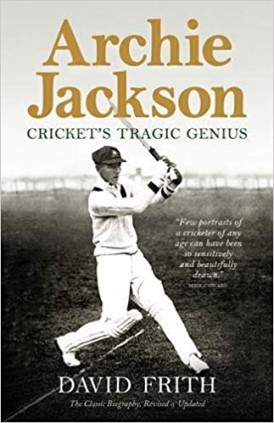Archie Jackson
Martin Chandler |Published: 2020
Pages: 152
Author: Frith, David
Publisher: Slattery Media Group
Rating: 4.5 stars

It is more than ninety years now since Archie Jackson departed this mortal coil at the age of just 23. A contemporary of Donald Bradman there were some wise observers who believed that, had illness not cut him down so tragically early, Jackson might have gone on to be the better batsman of the two. Many more of them would accept that the young man whose style and panache at the crease was often compared favourably to the legendary Victor Trumper, was much easier on the eye than the more utilitarian Bradman.
The story of the modest and immensely likeable young Jackson began in Scotland in 1909 and moved with his family to New South Wales when he was just four years old. His talent was such that he went on to a rapid rise through the Grades in Sydney and on to First Class and finally Test cricket. He scored a century in his second First Class appearance and, just two years later and still a teenager, he opened the batting in the fourth Test of the 1928/29 Ashes series. He scored 164 on debut. Even then was he already afflicted by the tuberculosis that claimed him just four years later? What is certain is that he never got the chance to make the most of his prodigious talent.
Jackson’s has always been a story worth telling but, of course, approaching the third decade of the 21st century, there is no one left alive who knew him, so is a biography tricky? In fact no, because this one is by the indefatigable David Frith, and the now octogenarian Frith put the hard yards in half a century ago. He spent many hours with Jackson’s great friend, Bill Hunt, a New South Wales and Australia teammate, and others who played with Jackson at Grade, First Class and Test level. In addition two of Jackson’s sisters and his fiancee supported Frith’s project. All have, of course, long since passed on.
One aspect of Frith’s character which is unusual is the fact that, for him, no project is ever finished. The Archie Jackson Story appeared back in 1974, and a revised edition, Archie Jackson: The Keats of Cricket appeared thirteen years later, so this is the third. Frith has also twice revisited his biography of Drewy Stoddart, once again the first and third editions being the greater part of half a century apart. Twice he has published studies of cricket’s suicides, and I am aware that he is keen to revisit his own autobiography, and in the past has indicated a willingness to produce a fresh edition of his first book, a collaboration with John Edrich that appeared as Runs in the Family in 1969.
So for those who own or have in the past read either of the earlier books I hasten to stress that Archie Jackson is not a simple reprint. It is not a full rewrite either, but at the same time half a lifetime of diligently gathering further evidence is grafted on to the original narrative and the story is as moving as ever, no more so than when referencing one record that Jackson had lost in 2007 to Bangladesh’s Manjural Islam Rana, that of being the youngest Test cricketer to die.
Frith is a man with a great understanding of the human condition, particularly insofar as that affects those who duel with bat and ball. In addition he has always had that, for an author, priceless ability to grip his readers’ attention from the very first page. Mind you he has a bit of help with this one because the foreword contributed by Harold Larwood back in 1974, and quite rightly reproduced in both subsequent editions is, by a country mile, the best foreword I have ever read. On the subject of tributes the book starts with a rather splendid one to the éminence grise of cricket history himself, from his editor, the (I assume) unrelated Russell Jackson.
If there are cricket lovers out there who have not read The Archie Jackson Story or Archie Jackson: The Keats of Cricket, then this one is essential reading, but even for those who own one or both of those books it is still, at just £15 for a nicely produced hardback, well worth investing in.






Leave a comment